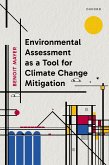This book traces the evolution of environmental principles from their origins as vague political slogans reflecting fears about environmental hazards to their embodiment in enforceable laws. Environmental law has always responded to risks posed by industrial society but the new generation of risks have required a new set of environmental principles, emerging from a combination of public fears, science, ethics, and established legal practice. This book shows how three of the most important principles of modern environmental law grew out of this new age of ecological risk: the polluter pays principle, the preventive principle, and the precautionary principle. Since the first edition was published, the principles of polluter-pays, prevention, and precaution have been encapsulated in a swathe of legislation at domestic and international level. Courts have been invoking environmental law principles in a broad range of cases, on issues including GMOs, conservation, investment, waste, and climate change. As a result, more States are paying heed to these principles as catalysts for improving their environmental laws and regulations. This edition will integrate to a greater extent the relationship between environmental principles and human rights. The book analyses new developments including the EU Charter of Fundamental Rights, the case law of the European Court of Human Rights, which has continuously carved out environmental duties from a number of rights enshrined in the European Convention of Human Rights, and the implementation of the UNECE Convention on Access to Information.
Dieser Download kann aus rechtlichen Gründen nur mit Rechnungsadresse in A, B, BG, CY, CZ, D, DK, EW, E, FIN, F, GR, HR, H, IRL, I, LT, L, LR, M, NL, PL, P, R, S, SLO, SK ausgeliefert werden.









